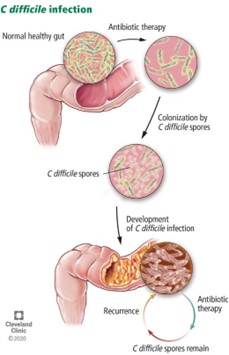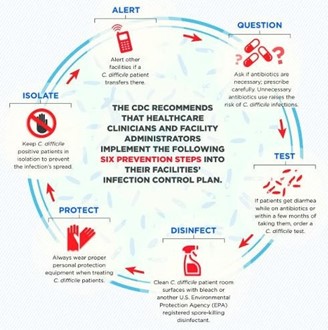A patient who is hospitalized with abdominal pain and watery, incontinent diarrhea is diagnosed with Clostridium difficile. In planning care for the patient, the nurse will:
order a diet with no dairy products for the patient.
explain to the patient why antibiotics are not being used.
place the patient in a private room with contact isolation.
Teach the patient about proper foal handling and storage.
The Correct Answer is C
Clostridium difficile is a highly contagious bacteria that can spread easily from person to person. The patient should be placed in a private room to prevent the spread of the infection to other patients. Contact isolation precautions should also be implemented, which involves wearing gloves and a gown when entering the patient's room, as well as washing hands thoroughly after leaving the room.
Options a and b are not directly related to the care of a patient with Clostridium difficile. Option d is also not directly related, although proper food handling and storage can help prevent the spread of other types of infections.


Nursing Test Bank
Naxlex Comprehensive Predictor Exams
Related Questions
Correct Answer is C
Explanation
The operating room is a sterile environment, and it is critical to maintain a clean and controlled environment to reduce the risk of infection to the patient. The measures taken include maintaining positive air pressure, controlling temperature and humidity, filtering the air, using sterile surgical instruments, and limiting traffic in and out of the operating room. These measures help to prevent the spread of infectious agents that may be present in the operating room. While the other options (a, b, and d) may also be important considerations in the design of the operating room, preventing transmission of infection is the primary goal.
Correct Answer is A
Explanation
The nurse will include the instruction "Offer the client the commode or urinal every 2 hours" in the teaching plan for the client's family. This approach is known as timed voiding and can help the client re-establish a regular pattern of urination. Option "a" promotes frequent voiding, which helps
prevent accidents and promotes bladder health. Option "b" is not a recommended approach and can lead to dehydration, urinary tract infections, and other complications. Option "c" is also not recommended since holding urine for extended periods can lead to bladder distention and increase the risk of urinary tract infections. Option "d" is also not recommended since catheterization should only be considered in specific cases where other options have failed or are not feasible.
Whether you are a student looking to ace your exams or a practicing nurse seeking to enhance your expertise , our nursing education contents will empower you with the confidence and competence to make a difference in the lives of patients and become a respected leader in the healthcare field.
Visit Naxlex, invest in your future and unlock endless possibilities with our unparalleled nursing education contents today
Report Wrong Answer on the Current Question
Do you disagree with the answer? If yes, what is your expected answer? Explain.
Kindly be descriptive with the issue you are facing.


